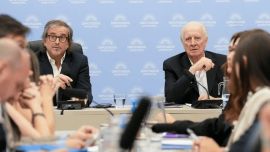Voting got underway Sunday in Argentina's presidential election after a campaign dominated by the economic downturn.
With the country locked in a deep recession and experiencing rising poverty and runaway inflation, Peronist candidate Alberto Fernández is seen as the strong favourite to oust market-friendly President Mauricio Macri.
Opinion polls point to a crushing victory for the 60-year-old Fernández, whose running mate is ex-president Cristina Fernández de Kirchner. Some see his lead as strong enough to win the presidency outright in the first round.
Polls opened at 8am local time, with results expected at about 9pm – three hours after voting ends.
Fernández cut a relaxed figure early Sunday, taking his popular brown-and-white collie Dylan for a walk in a Buenos Aires park. "We all have to be calm, enjoying this happy day in which we Argentines are voting," he said.
The likely return to power of protectionist Peronists comes amid a lengthy recession and a debt crunch, raising market fears of a possible default on a US$57-billion IMF loan.
The peso fell 5.86 percent in the week before the elections, and the week ended with the dollar at 65 pesos. Long queues were seen outside banks on Friday.
Fernández has insisted his government would not default, but rather seek to renegotiate the terms of the loan, and sought to reassure voters that their bank deposits would be safe under his administration.
Stashing the cash
Martín, a 50-year-old filmmaker, said Friday he did not believe Fernández.
He was carrying a suitcase full of cash and intended to buy US$3,000 at a busy foreign currency exchange in Buenos Aires.
"It's the same old story. My parents lost everything in the corralito. I don't want it to happen to me," he said, referring to the 2001 default crisis when people were blocked from withdrawing their money.
Since Fernández's crushing victory in August primaries, which made him the favourite for the presidency, Argentine savers have withdrawn around US$12 billion from their accounts.
Whoever wins must reach a consensus to navigate a polarised Argentina out of the crisis.
"This isn't so much a Fernández win as a Macri loss. It's a vote of repudiation, and in a vote of repudiation people seem to have little patience [with the resulting government]," said Monica de Bolle of the Peterson Institute for International Economics.
"My take is that what we will see is a period where a lot of questions are going to be asked and we're going to see how politically able Fernandez is going to be to handle those questions," she told AFP.
Beyond showing his determination to bring about change, Fernandez has given scant details of how he intends to do so.
In primaries held in August, Fernández garnered 49.5 percent of the vote compared to only 33 percent for Macri, whose nearly four years in power have been marked by economic woes.
Macri blamed Argentina's economic problems on previous Peronist governments under Fernández de Kirchner (2007-15) and her late husband Néstor Kirchner (2003-2007).
Today is the ninth anniversary of Néstor's death.
Safe hands
Macri, 60, has presented himself as a safe pair of hands and campaigned to be given the chance to follow through on his policies.
His supporters have warned of surprises, pointing out there were no polls published since a massive rally in central Buenos Aires last weekend.
"Mauricio Macri was far from perfect, but he had all the good intentions and the last thing we want is to return to the past, 12 years of Kirchnerismo did not help, we are a failed country," said Tomás Villar, 23, a political science student.
Macri's popularity has fallen off sharply over the last year in which Argentina has been in recession.
The poverty rate has risen to more than 35 percent, inflation for the year to September was at almost 38 percent, while the peso has depreciated 70 percent since January 2018. That, and the austerity measures Macri subsequently was forced to announce, proved highly unpopular in a country where the spending power of many has dropped dramatically.
Under Argentine law a candidate can win the presidency in the first round if he reaches 45 percent of the vote, and a 10 point margin over his nearest rival. Otherwise a second round will be held on November 24.
– TIMES/AFP

























Comments